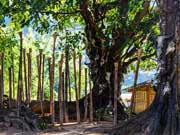

San Francisco, August 10th – Living with host families, taking classes with local students, visiting prestigious universities and most importantly, learning English, it’s 13-year-old Chinese student Liu Zhuofan’s summer camp life in California.
This late July, together with another 29 middle school students from Beijing, Xinjiang and Shenyang, he flew half way around the world to the U.S. for a 24-day summer camp.
“Interesting, hungry, and tired,” Zhuofan managed to summarize his past two weeks in the U.S. with these three English words. After 14 days’ “authentic” American school life in Los Angeles, these campers took the late night flight to San Francisco to complete the rest half of their camp.
The United States is not his first camp destination. Zhuofan, like a migrant bird, took different camps during his summer or winter breaks in different English-speaking countries.
Tours like this have been a fast-growing industry in China that aims to attract middle-class parents eager to give their children a comprehensive English studying experience and a glimpse of the foreign culture, especially prestigious schools such as Yale, Harvard and Stanford -- all in about two to four weeks.
According to New Oriental, China’s biggest education group, the number of Chinese students taking overseas study tours has reached 300, 000 in 2015 since the first tour started in 2005. And the market value has reached around 10 billion Chinese yuan. The United States takes about 40% of all the tours.
“The students taking part in the overseas summer camps are getting younger,” Liu Min, director of New Oriental’s oversea study program in Xinjiang told People’s Daily Online. A 2015 report by Ctrip revealed that the Chinese students who plan to travel abroad for summer camps are three years younger than the travelers in 2014. The age ranges from 8 to 15 years old. Such trend coincided with the prevailing low-aging trend of oversea Chinese students.
To satisfy the continuously diverse demands of parents and students, different themes of camps are customized to different age groups from kindergarteners to the white collars. Many parents also go to summer camps organized by American local institutions. For example, Ms. Liu flew from Beijing to attend San Francisco’s 5-day Roughing It Summer Day Camp with her 9-year-old son Bob.
For Liu Zubing, father of Zhuofan, attending such tours is preparing his son for future education in the U.S. universities. While Ms. Liu is trying to put her son in an immersed English learning environment. Compared to those taking summer training schools in China, these migrant birds have a different continuation of school in a different way, an of course, in a different country.
At roughly $5,000 to $10,000 per student, such American summer camps aren't affordable for the average Chinese family. High-spending parents often have high expectations for summer programs. However, problems also come with the growing lucrative business.
It seems the little campers haven’t realized why their parents sent them abroad. When asked about what he has learnt in the past weeks, Zhuofan told People’s Daily Online on the tour bus to Pier 39, San Francisco, “I wasn’t listening in the English class. I was playing with my iPhone all the time and the math class was too easy for all of us.”
The other students are sleeping - owing to the intense schedule that they have to visit San Francisco, New York, Boston, Washington DC, and Philadelphia in the next 10 days, the little campers slept through all the tour guide’s explanation of local customs and practices. “Can we just go back to the hotel and sleep?” one camper asked the tour guide.
“Chinese students are too shy to speak to American students,” said Xiayidan, one of the two lead teachers of Zhuofan’s camp, “How can they improve their English if they stay with their Chinese friends and speak Chinese all the time?” Mr. Lee, who has 10 years’ tour guide experience in China’s oversea summer camps, also told People’s Daily Online about his concern, “Too much time spending on their smartphones. They played with their phones in the class and during the sightseeing. I don’t want them to waste their time here.”
Another side effect of the tour is “showoff competition”. “The kids compare their summer experiences at school. Bob told that one of his classmates took a trip to 10 European countries last summer and he wanted to go, too. It gives the parents a lot of pressure,” Ms. Liu told People’s Daily Online.
When asking to give a score to the tour, “I’ll give 99 points!” said Zhuofan, “one score off because of the food.” Although the kids were “tired and hungry” all the time, most of them still want to take part in an oversea summer camp next year, “the Universal Studio and Disneyland are awesome,” they told People’s Daily Online, excitedly.
For the parents, Liu Zubing said, “You cannot measure the money you invested to the children’s education just to their contemporary performance.” He concluded with an ancient Chinese saying, “To read thousands of volumes and travel thousands of miles. There’ll be gaining more or less.”
Day|Week

 Who Will Fit The Chinese Roles In Game Of Thrones?
Who Will Fit The Chinese Roles In Game Of Thrones? China's Hubei Shennongjia added to World Heritage List
China's Hubei Shennongjia added to World Heritage List Cute Dog At Fruit Stand Becomes Latest Internet Sensation
Cute Dog At Fruit Stand Becomes Latest Internet Sensation Thai most beautiful transgender Nong Poy release new photos
Thai most beautiful transgender Nong Poy release new photos Top 10 livable Chinese cities
Top 10 livable Chinese cities The last primitive tribe in China
The last primitive tribe in China China's first intelligent security robot debuts in Chongqing
China's first intelligent security robot debuts in Chongqing A Total of 3,552 Subscribers Vanish In Two Days; YouTube Closes All Doors to Users’ Inquiries
A Total of 3,552 Subscribers Vanish In Two Days; YouTube Closes All Doors to Users’ Inquiries Out of this world! Futuristic UFO-shaped yacht has its own garden and a stunning underwater viewing deck
Out of this world! Futuristic UFO-shaped yacht has its own garden and a stunning underwater viewing deck An old tea house in Chengdu
An old tea house in Chengdu